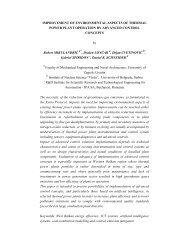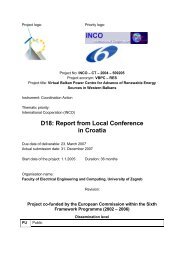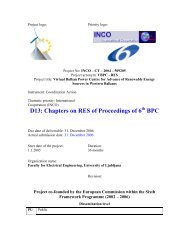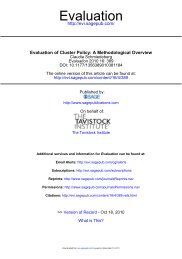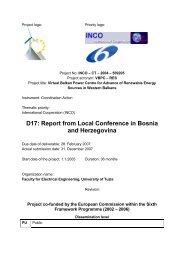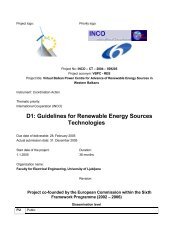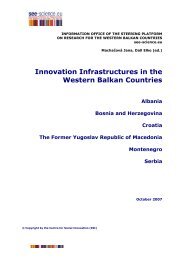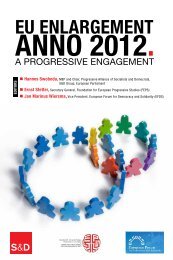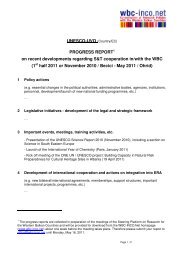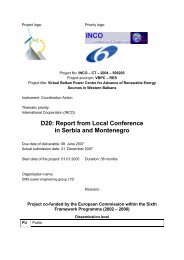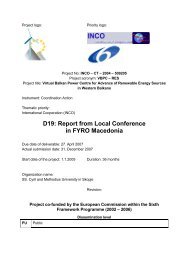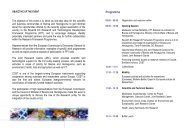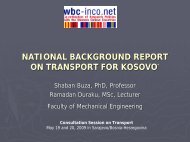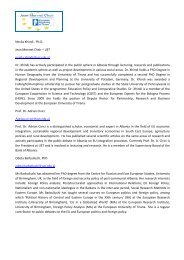Catalogue of Research Groups from Moldova - WBC-INCO Net
Catalogue of Research Groups from Moldova - WBC-INCO Net
Catalogue of Research Groups from Moldova - WBC-INCO Net
You also want an ePaper? Increase the reach of your titles
YUMPU automatically turns print PDFs into web optimized ePapers that Google loves.
SEVENTH FRAMEWORK<br />
PROGRAMME<br />
THE INSTITUTE OF EDUCATIONAL SCIENCES<br />
Organization activity type : RES<br />
FP7 theme : EnV<br />
Contact person : Dr. Angela Cara<br />
Address : Institute <strong>of</strong> Educational Sciences<br />
104, Doina street<br />
MD-2059, Chisinau<br />
Republic <strong>of</strong> <strong>Moldova</strong><br />
E-mail : cara69@mail.ru<br />
webpage : www.ise.md<br />
BRIEf dESCRIpTIon <strong>of</strong> ThE oRganIzaTIon<br />
Institute <strong>of</strong> Educational Sciences is a national institute for research and development in education.<br />
Through research, publications, policy recommendations the Institute provides educational leadership<br />
in the educational system <strong>from</strong> the Republic <strong>of</strong> <strong>Moldova</strong>.<br />
KEywoRdS on CoRE CompETEnCIES<br />
Continuous training, educational policies, curricula development, inclusive education, social protection<br />
ExpERTISE / CompETEnCIES / TEChnologIES / RTd Know-how<br />
• Analytical reports with regard to education (National report “The Prospects <strong>of</strong> Teacher Education in<br />
South-East Europe”), other annual and thematic reports.<br />
• National and international educational projects identification and participation.<br />
• The elaboration <strong>of</strong> school curricula.<br />
• Investigating themes referring to social-human education.<br />
InTERnaTIonal CoopERaTIon ExpERIEnCE<br />
2009 : Coauthor <strong>of</strong> the study “Secondary Education - child-friendly schools assessment” (Ministry <strong>of</strong><br />
Education & UNICEF).<br />
The aim <strong>of</strong> the study was to assess the quality <strong>of</strong> the basic education in <strong>Moldova</strong> through the five necessary<br />
dimensions for child-friendly schools : • inclusive and noninclusive, • academically effective, • healthy,<br />
safe and protective, • gender-responsive, • involved with students, families and communities. The study<br />
contains recommendations for public policy, aimed to implement the concept <strong>of</strong> Child-Friendly Schools<br />
in the educational system <strong>from</strong> <strong>Moldova</strong>;<br />
2010 : Modernization <strong>of</strong> school curricula : Institute <strong>of</strong> Educational Sciences & UNICEF;<br />
2007 : Local counsellor : Elaborating standards <strong>of</strong> pr<strong>of</strong>essional continuous training as part <strong>of</strong> a World<br />
Bank Project “Quality education in rural areas <strong>of</strong> <strong>Moldova</strong>”, implemented by the Ministry <strong>of</strong> Education<br />
and Youth, without a specialized PIU (Project Implementation Unit);<br />
2005 : Coauthor <strong>of</strong> the national report : The prospects <strong>of</strong> teacher education in South-East Europe,<br />
Republic <strong>of</strong> <strong>Moldova</strong>, Educational Policy Studies <strong>of</strong> Education.<br />
University <strong>of</strong> Ljubljana, Faculty <strong>of</strong> Education, Ljubljana.<br />
35



